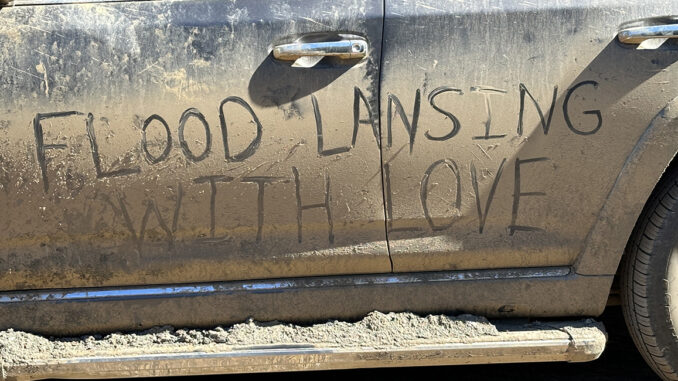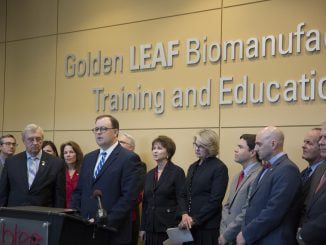
Former state Sen. Deanna Ballard has seen firsthand the devastation of Hurricane Helene and will be telling the recovery stories from western North Carolina for North State Journal.
As the floodwaters receded in the wake of Hurricane Helene, much of Ashe County lay in ruins — but for Emily and Leeth Davis, the devastation marked the start of a relentless mission.
Only three days after the storm ripped through their community, the Davises were already armed with tools and supplies, driving around in their all-terrain vehicle looking to serve those who needed it most. When their friend, local business owner Steven Howell, sent out the call for help, they knew where to start — Lansing.
There they found a handful of locals, chainsaws in hand, already battling the wreckage in off-road vehicles. Wasting no time, the Davises set up a makeshift command center in the middle of the street, spreading maps across a card table to organize the efforts. Emily remembers a surge of support from people, each one prioritizing the well-being of their neighbors over their own struggles.
“It truly was ‘We the People,’ everyone just helping each other,” she reflects.
Pulling up to a particularly devastated area outside of Lansing, nothing could prepare them for the level of destruction that felt eerily otherworldly.
“It looked like an earthquake,” Emily remembers. “Pictures don’t do it justice.”
A small cluster of seven homes had been completely cut off, their bridges washed away, leaving them stranded. Residents said they hadn’t seen another person in days. Isolated with no way out, they’d taken to calling themselves “Roaring Fork Island.”
For the next three days under the Davises’ leadership, crews of volunteers worked on Roaring Fork Island to remove debris and deliver necessities. In an extraordinary act of generosity, Cable’s Enterprise from Brown Summit arrived shortly after and repaired both bridges at no cost. Leeth estimates their contribution reached $450,000 of value in kind. Privately owned businesses such as L&E Lumber and Fitch Lumber have donated supplies and offered steep discounts.
Despite the destruction, spirits are hopeful and steeped in gratitude. The Davises acknowledge there is a time for mourning, but right now, they are more interested in getting to work.
“That’s the tough part about being a leader — you have to figure it out. There are no timeouts,” says Leeth.
When Emily and Leeth Davis moved to West Jefferson in 2022, they set out to build their dream — 40 acres of rolling countryside where they could create something of their own. They founded 4Creeks Cabin Co., a collection of small, eclectic vacation rentals designed to help visitors slow down, connect with nature and spend quality time together. Quickly plugging into their new local community, they relished the country landscape where they could raise their two young children with the values they hold dear — hard work, stewardship of the land and investing in people.
But the Davises are no ordinary business owners. Behind their dream is a wealth of expertise and an unshakable commitment to serving others. Leeth and Emily grew up together in Gastonia and attended the same preschool. Married in 2013, the heart-centered entrepreneurs share a deep-rooted connection that extends into their professional lives.
Emily graduated from UNC Charlotte’s engineering school and amassed more than a decade of bridge-building experience. Leeth is a helicopter pilot with experience in heavy equipment operation. Together, they’ve mastered the art of project management and structural engineering, making them equipped to tackle the challenge ahead.
In the wake of Hurricane Helene’s destruction, the couple put their lives and business on hold. In response, they established a nonprofit called Lansing’s Bridge to Recovery. In just three weeks since the hurricane tore through the western half of the state, Emily and Leeth have coordinated the rebuilding of more than 40 private bridges, roads and culverts — an incredible feat considering each project typically takes a week to complete. Among the places restored by their efforts are historical landmark Stikes Holler in Warrensville and Camp New Hope in Jefferson. Their nonprofit has currently raised nearly $90,000 in cash donations and roughly $750,000 through gifts in kind from various North Carolinian companies volunteering equipment, materials and manpower.
While county officials struggle to handle the sheer scale of the disaster, Leeth and Emily have taken it upon themselves to move recovery efforts forward. Though the county is no longer in a state of emergency, they continue to move with a sense of urgency. Because they’re a privately organized nonprofit, they can move more quickly than local and state governments.
“We’re doing our best to make the county aware of the asset they have here in our initiative and what we’re able to do,” Leeth explained. These highly trained professionals hope to work closely with county officials in the future to share with them their tried-and-true process.
As winter approaches, the need for donations and skilled volunteers rises more urgently than ever. Lansing’s Bridge to Recovery is moving swiftly, but there is still much work to be done. The nonprofit’s newly launched website is now live, making it easy to contribute — whether through donations, volunteering or purchasing merchandise, with 100% of proceeds directly supporting recovery efforts.
As North Carolinians continue to provide support to heavily impacted areas, it’s crucial not to lose sight of the long road ahead. Recovery won’t be finished in a matter of weeks. It will take months, even years, to rebuild. To offer resources, skills, or support, visit lansingbtr.org. The ongoing recovery efforts can also be followed on Instagram (@lansingsbridgetorecovery) and Facebook (Facebook.com/lansingbtr).
“The really profound effect was the concentration of all these good folks who got together under a common mission,” Leeth said.


